

Objective journalism - exists and growing. When I started as a journalist, I always went directly to the source, or at least what I thought were the sources.

These days, copying and pasting is a bigger part of journalism. Just this weekend, a NYTimes article, gave pointers to journalists who couldn't copy and paste. The article asked: "How can they [reporters] do their jobs if they can't copy and paste stuff from the Internet? " Goodness. The NYTimes says reporters can't be reporters without copying? To be sure, copying and pasting -- with attribution and linking -- isn't all bad. The challenge for objective journalism, however, is that in the age of the Internet - where anyone can declare themselves a "journalist" and prophet, subjective journalism is growing faster.
"It's like obscenity," said Blaise Zerega, deputy editor at Portfolio, regarding his views on objective journalism. Objective journalism and mainstream media games. When I was sixteen years old, I had a memorable conversation with a friend about what we wanted to be when we got older.

I — in my typical state of indecision — rambled off a slew of completely unrelated job possibilities. I’m pretty sure one was an acrobat. My friend, on the other hand, had tunnel vision. She wanted to be a journalist. Principles of Journalism. The first three years of the Project’s work involved listening and talking with journalists and others around the country about what defines the work.

What emerged out of those conversations are the following nine core principles of journalism: 1. Journalism’s first obligation is to the truth Democracy depends on citizens having reliable, accurate facts put in a meaningful context. Journalism does not pursue truth in an absolute or philosophical sense, but it can–and must–pursue it in a practical sense. 2. While news organizations answer to many constituencies, including advertisers and shareholders, the journalists in those organizations must maintain allegiance to citizens and the larger public interest above any other if they are to provide the news without fear or favor.
Rethinking Objective Journalism. July 8, 2003 | Like this article?
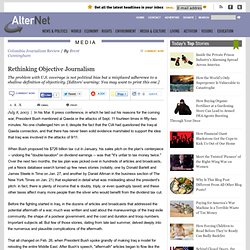
Join our email list: Stay up to date with the latest headlines via email. In his Mar. 6 press conference, in which he laid out his reasons for the coming war, President Bush mentioned al Qaeda or the attacks of Sept. 11 fourteen times in fifty-two minutes. No one challenged him on it, despite the fact that the CIA had questioned the Iraq-al Qaeda connection, and that there has never been solid evidence marshaled to support the idea that Iraq was involved in the attacks of 9/11.
When Bush proposed his $726 billion tax cut in January, his sales pitch on the plan's centerpiece -- undoing the "double-taxation" on dividend earnings -- was that "It's unfair to tax money twice. " Who Betrayed Objective Journalism? The mainstream U.S. news media often laments the decline of objective journalism, pointing disapprovingly at the more subjective news that comes from the Internet or from ideological programming whether Fox News on the Right or some MSNBC hosts on the Left.
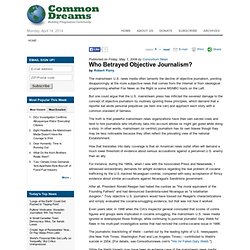
But one could argue that the U.S. mainstream press has inflicted the severest damage to the concept of objective journalism by routinely ignoring those principles, which demand that a reporter set aside personal prejudices (as best one can) and approach each story with a common standard of fairness. The truth is that powerful mainstream news organizations have their own sacred cows and tend to hire journalists who intuitively take into account whose ox might get gored while doing a story. The handbook of journalism studies - Karin Wahl-Jorgensen, Thomas Hanitzsch. Objective Journalism Isn't Dead and Hasn't Been Replaced. By Matthew L.
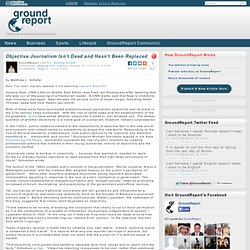
Schafer Note: This report originally appeared in the media blog Lippmann Would Roll. Octavia Nasr, CNN’s Senior Middle East Editor, was fired last Wednesday after tweeting that she was sad at the passing of a Hezbollah leader. A CNN memo said that Nasr’s credibility was irrepreply damaged. Nasr became the second victim of Israeli angst, following Helen Thomas’ departure from Hearst last month. Discovering journalism - Warren G. Bovée. Objectivity and Fairness - Objectivity and fairness in news stories. You hear it all the time – reporters should be objective and fair.
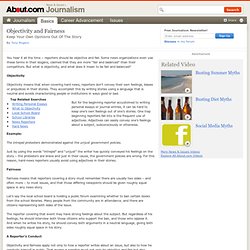
Some news organizations even use these terms in their slogans, claimed that they are more “fair and balanced” than their competitors. But what is objectivity, and what does it mean to be fair and balanced? Objectivity Objectivity means that when covering hard news, reporters don’t convey their own feelings, biases or prejudices in their stories. They accomplish this by writing stories using a language that is neutral and avoids characterizing people or institutions in ways good or bad. But for the beginning reporter accustomed to writing personal essays or journal entries, it can be hard to keep one’s own feelings out of one’s stories. Objectivity (journalism) Journalistic objectivity is a significant principle of journalistic professionalism.
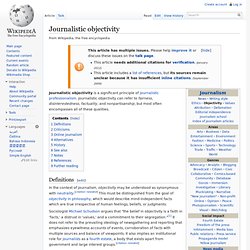
Journalistic objectivity can refer to fairness, disinterestedness, factuality, and nonpartisanship, but most often encompasses all of these qualities. Public Journalism and the Problem of Objectivity.